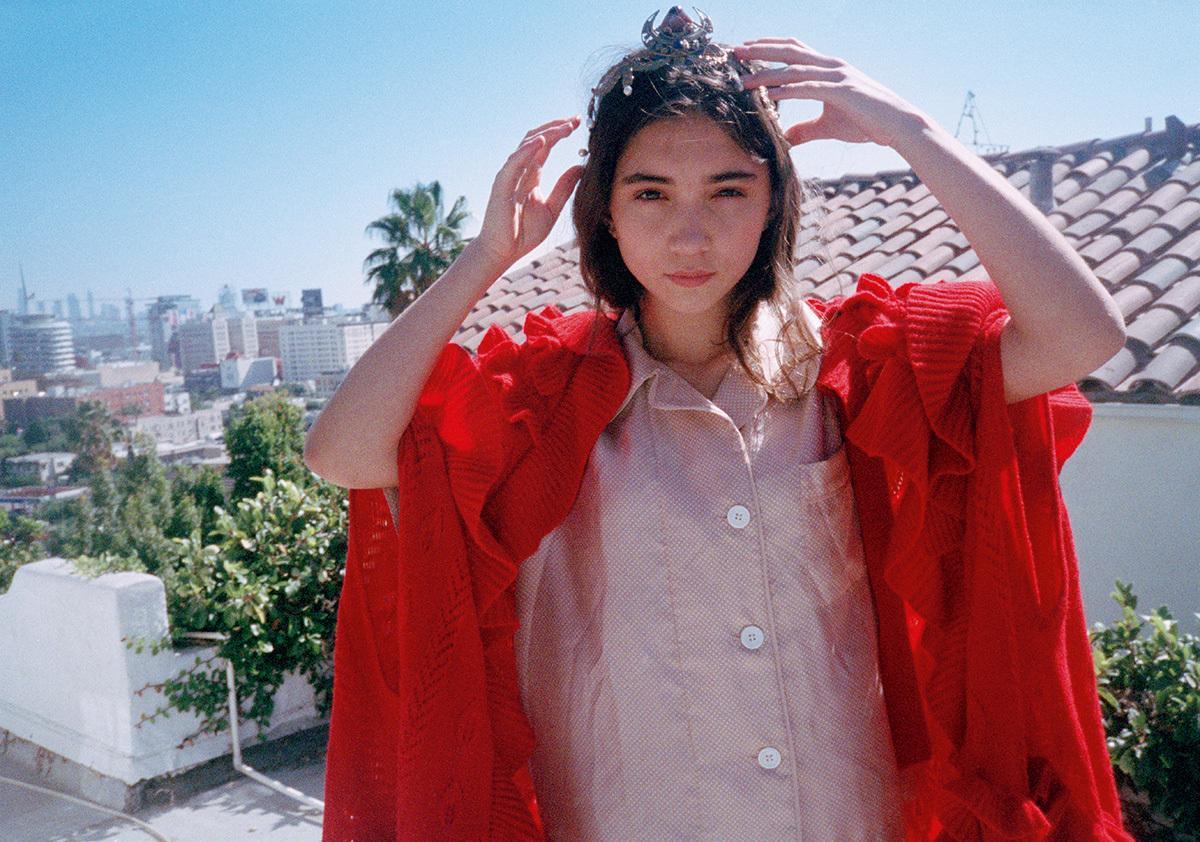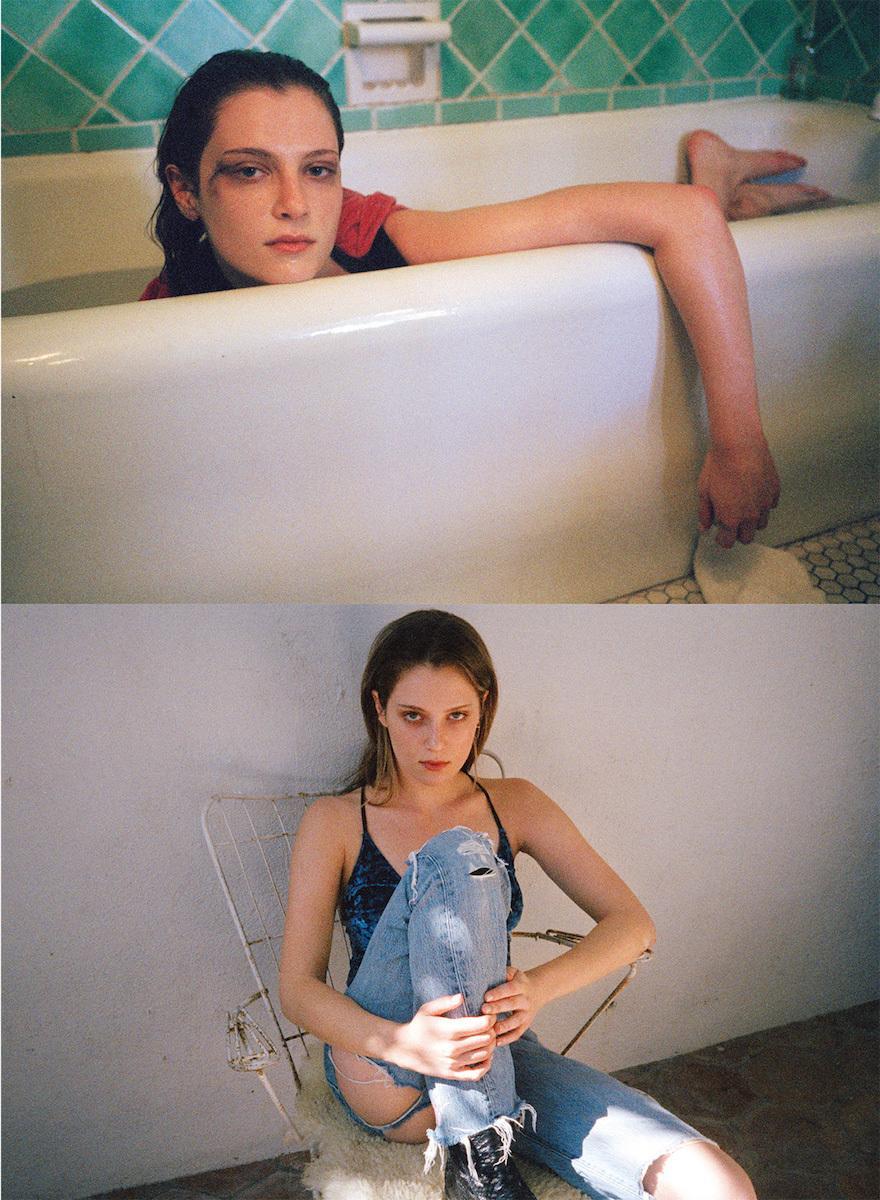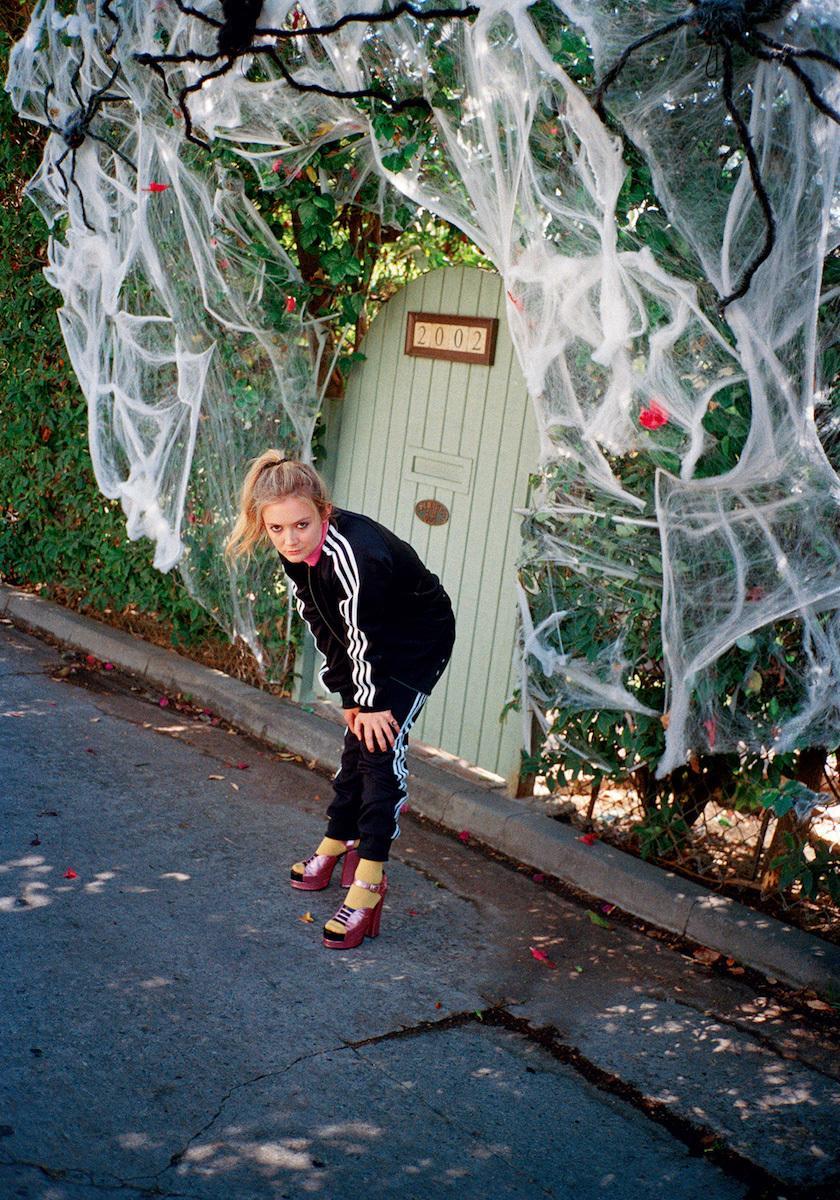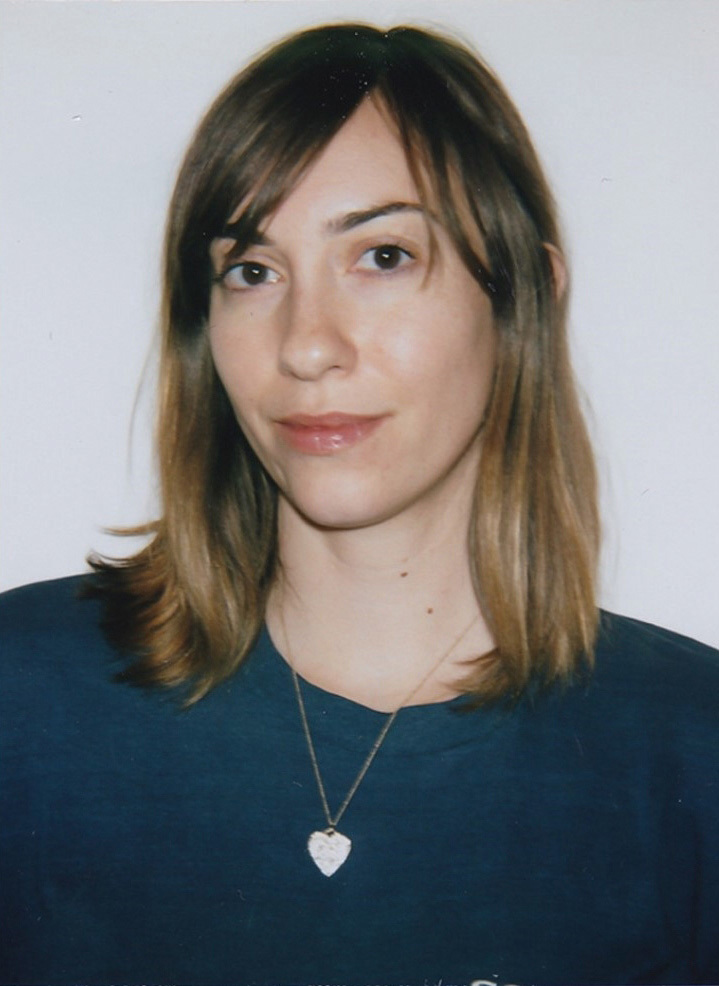Navigating L.A. on four wheels is notoriously painful; interminable traffic, oppressive pollution, and maniacal motorists all conspire to make the experience a not entirely pleasurable one. But with Gia Coppola at the wheel, everything manages to be Instagram filter dreamy. “I love the flatness and the nature and just driving,” she explains on the phone as she pulls onto her driveway, “I really don’t mind driving.”
Making the mundane appear attractive is a particular skill of Coppola’s, a photographer, filmmaker, and actress. Her debut film Palo Alto, adapted from a short story by James Franco, was marked by its quiet vision of aimless cruising by adolescents in the wealthy Cali suburb of the same name. Not much happens — but it does happen rather beautifully. Franco insisted Gia direct the film after her mother, Jacqui de la Fontaine, introduced them to each other at a party.
She already had an enviable reputation with fashion designers by this point. After making a short for a friend, she was hired by Opening Ceremony to make films starring Kristen Dunst, Jason Schwartzman, and Zac Posen. Her nostalgia-tinged, dream-like aesthetic soon drew further job offers from Diane von Furstenberg and Rodarte.
Read: Hollywood upstarts become full-blown stars with a role in a Coppola film, so you better believe these talented actresses, handpicked by Gia herself, are destined for big things.
All this might seem inevitable, given her last name. Granddaughter of Francis Ford Coppola, she spent her childhood between L.A. and the Coppola family vineyard in Napa Valley. She got her apprenticeship in film through her aunt, Sofia, on whose film sets she hung around, eventually working in the costume department on Somewhere. Gia’s childhood was also marked by tragedy; her dad died in a speedboat accident while her mother was pregnant with her. Although she of course never met her father, Gian-Carlo Coppola, he nonetheless inspired her creative outlet. “When I was younger my uncle gave me my father’s camera and he always loved photography,” she says. “I think he saw me as a shy girl, trying to figure out my creative outlet and not being very academic in school. I couldn’t draw and I think photography, having that connection to my father, felt like guidance or a sign.”
She dropped out of high school but found her vocation in photography at Bard College in New York. Though the move into film might have been predicted, her family connections haven’t always ensured an easy ride. She had to work hard to get Palo Alto made, even at its modest budget. Currently, she is prepping for her second feature, an adaptation of the book The Secret Life of the Lonely Doll. A tragic biopic of children’s author Dare Wright, it should cement her place in cinema as a Coppola to be reckoned with.
But she still pursues both fashion and photography, working with the likes of Gucci and shooting this portfolio of young acting talent for this issue of i-D. Once Gia turned off the ignition, we got down to talking about her inspiration, work methods, and what drives her.
Read: Meet the young actresses shaping the future of Hollywood, part two.
Why did you find yourself drawn to photography?
It felt really good to hide behind the camera. I’ve always been an observer.
What was the make of your dad’s camera that your uncle passed on to you?
An old Nikon manual camera. It didn’t really work [laughs] but it was nice to have. I got into Polaroids, making books with my friends, very teenage girl stuff.
How was growing up in L.A.?
Well, my family is from northern California so I feel like I got to get out of the L.A., and the Hollywood bubble. I kind of had a normal childhood, just hanging out in Palo Alto, driving around with friends in a car.
Was that what initially attracted you to adapting James Franco’s book?
Totally. I feel like L.A. and more suburban cities in general, you have that childhood where the most fun part of your night is just hanging out in parking lots and driving around. It’s so exciting. That was your freedom at that age, having a car.
What was your first car?
My first car was my mom’s old car, which was a Mercedes E320, early 90s. It was a beautiful car, this purple blue color. It was a Mercedes but I swear it wasn’t glamorous. It was an older version. I was so ready to get my license.
Why? Was it about freedom?
Totally. Now I look at the youth in L.A. and you have Uber and it’s much safer and better but at the time when I was younger, you had more privacy when you had a car and didn’t have to rely on your parents dropping you off. They don’t know where you are at all times.
What was your driving soundtrack?
I was a huge Strokes fan; they changed my life. I feel like when you’re a teenager, you’re into finding the most obscure bands like Suicide, Television, and the Ramones and looking up old punk bands. There used to be those Rhino [record label] boxsets and they would do every genre like British new wave and girl groups. But now no one has a CD player.

Do you think we lose that curiosity?
I’m definitely drawn to the youth because there is a certain curiosity that goes with that age. As you get older, you get more comfortable and lazy. You turn on the radio and listen to Top 40 instead of searching for the cool new thing.
What are you passionate about now?
I feel like I’m trying to be creative and find things that feel good to me, that make me happy and make me feel comfortable with myself.
Is that difficult to master?
I feel like I’m constantly struggling with insecurities. I feel inspired by watching movies and looking at photographs; that’s the most fulfilling thing. As you get older you start to learn how to balance all the relationships in your life and be protective of who you are and focus on being a good person.
Do you feel there’s not enough of that in the world?
I look at Instagram and everything that’s happened with the [U.S.] election. Pop culture is fascinating to me but it is also toxic in a lot of ways. Maybe that’s why I am reverting to myself lately. I always give people the benefit of the doubt and believe everyone is good. There are reasons why people act as they do. You have to dive deeper as to why.
Do you find social media negative?
It’s definitely a love hate relationship. There’s a lot I can get inspired by but I can get lost in it. I think a lot of people feel that; they can get insecure. It can be distracting. It is super fascinating and interesting. I’ve met cool people and made great art trades through it. I’ve been inspired by photos. But there’s something about that short term immediacy that affects my attention span. So sometimes, I decide I’m going to read a book.
Is there a book you would recommend?
I love Girls on Fire by Robin Wasserman, which I just read. It’s about teenage girls and the friends you make when you are young and how influential that can be, how it can steer you. It’s kind of like a female version of Palo Alto. I’m very interested in female energy and how powerful girl friendship bonds are.

How was making the film with James Franco?
I always admire him for the position he’s in and how supportive he is to women in giving us opportunities. Looking back at the experience with Palo Alto and the experiences trying to get other things off the ground, I had such liberty to do what I wanted. You have to articulate why you can do something or have to prove yourself so much, so to have someone trust you and even give you an opportunity is great. It’s a great challenge to be an advocate for yourself but it’s definitely hard to have that self-belief.
It definitely helps in some regards but it is a hindrance as to being able to define myself as my own person with my own vision. I work hard for a reason; because it challenges me, makes me grow as a person, and gives me stories to tell. I don’t want to neglect myself of those experiences. I’m grateful I have wise people who have experienced that in all different forms, who I can turn to for advice. They are about doing what is right in your heart.
Is there one piece of advice from Sofia that really struck you?
She’s always been someone I’ve looked up to. She’s someone who is very sure of who she is. My grandfather has a very loud personality when it comes to directing and she’s very quiet. Being a woman I don’t think I would have considered doing filmmaking and photography if I hadn’t seen her doing it. She stayed true to who she was and it made me think I could do it in a way that was true to me and not have to pretend I was this big, strong male director.
Are you conscious of your gender in cinema?
No. I get a little aggravated when people differentiate female directors. We’re just directors. Why does that have to be segregated? I feel like I’m just trying to make myself that, aside from being a woman.
What are you like on set?
My demeanor is quiet, shy, and awkward. Once I get comfortable with people — working with actors I knew was going to be the hardest part for me and one of the most important parts — I try to speak as honestly and vulnerably as I can. Once you get to know people you can be funny and silly. I try not to give too much direction. I hang back and let things take shape.
What can you tell me about your next film project?
It’s a wonderful book. It’s something I could relate to. It’s a woman who used her art, her photography, to convey her life. She had a complicated life but there was something so beautiful even though it was so tragic. I feel like everything stems from how we were raised; I grew up with a single mom and obviously I didn’t have a dad so I connected in that way. I don’t find my life as tragic.

Why do you continue with photography?
It’s a fun way to be creative. Film is such a long process and you really have to hone in on a subject matter and dive in to something really deeply. It’s wonderful and I love that. But when I want something simple and gratifying creatively, I feel like photography fulfills me in that way. It’s a way to meet people. Especially with this i-D shoot, I got to meet the actresses. Instead of going for coffee, it’s fun to play around and play dress up and take pictures.
Beyoncé’s Lemonade was an inspiration for your recent Gucci film. How so?
I just thought it was so honest, innovative, emotional, and powerful. I’m always drawn to things that stem from that.
What do you enjoy about working in fashion?
When I was younger it was harder for me to feel fashionable and to have that pressure. Now I’ve become friends with some of the designers and watching their process is so interesting. Fashion and style are a way of conveying how you feel, on the outside. I find it fun and enjoyable and another way to be creative.
If I came to L.A. for a weekend, what would we do?
I like having people over who have never been to L.A. or had a good experience with L.A. So I’d introduce them to other people I find interesting, cook dinner, go on weird adventures, and just kind of be mellow.
Would we go for a car ride?
For sure! Just cruising.
Credits
Text Colin Crummy
